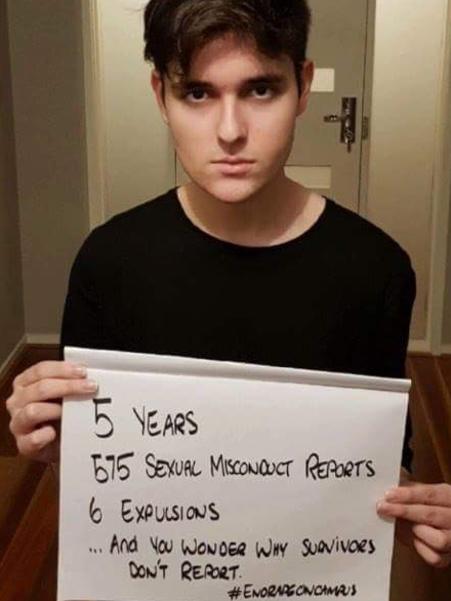What we must not forget about campus sexual assaults
THE results of a nationwide university sexual assault and harassment survey are in. But survivors want us to remember one thing, writes Seb Starcevic.
Rendezview
Don't miss out on the headlines from Rendezview. Followed categories will be added to My News.
THIS morning, the results of the Human Rights Commission’s nationwide university sexual assault and harassment survey came in. And it’s worse than we thought.
Commissioned by The Hunting Ground Australia Project and Universities Australia, the study — released to the public just hours ago with recommendations soon to follow — involved all 39 major universities and can be read in its entirety on the HRC’s website.
If nothing else, the findings show rape on campus isn’t just an American problem. In fact, Australia is lagging decades behind the US when it comes to the research and prevention of sexual assault.

For starters, as valuable as the HRC’s data is, the fact that it’s taken this long to come up with hard numbers when there have been dozens of similar studies in the US over the years — the first national rape survey on college campuses in the States took place in 1987 — speaks volumes about our reluctance to address this issue.
Not to mention the study has been mired in controversy since the beginning, from concerns about the ethics process to claims of the survey being hijacked by universities themselves, as RendezView has extensively reported.
And it’s not like university sexual misconduct is a new problem. Far from it: newspaper archives prove the incidence of rape and sexual violence at Australian universities has been charted for 40 years, give or take.
“Student rape all part of the fun, women allege,” reads one headline, dated January, 1977.
“Students providing list of sexual blackmailers,” asserts another, from March, 1979.

Both articles — published in the Sydney Morning Herald and The Age, respectively — are remarkably current despite being almost half a century old. Common themes include toxic rape culture at residential colleges, female students being “sexually blackmailed” by senior academics and survivors who are intimidated out of reporting.
It doesn’t help that the conversation about rape on campus is heavily informed by documentary films like The Hunting Ground and infamous cases such as that of “Stanford rapist” Brock Turner, which — while serving as useful footnotes — are undeniably Americentric and don’t account for the international complexities of rape culture.
For instance, in the US, survivors are able to access legally enshrined mechanisms for reporting.

One such mechanism is Title IX, which proclaims: “No person in the United States shall, on the basis of sex, be excluded from participation in, be denied the benefits of, or be subjected to discrimination under any education program or activity.”
Meanwhile, despite enjoying anti-gender discrimination policies, namely the Sex Discrimination Act of 1984, no equivalent of Title IX exists for Australians.
“America is decades ahead of Australia in their legislative responses to sexual assault within university communities,” End Rape on Campus Australia Ambassador Nina Funnell says.
“In the US, there’s Title IX as well as the Clery Act, which requires colleges to publish their crime data. But here it falls to the media, advocates and survivors to submit time-consuming and expensive FOI requests — which can then be refused.”
In the lead-up to the HRC’s report, students and survivors (including myself) have condemned universities for this sort of administrative inaction in a powerful photo campaign lead by Funnell, who says the idea is to reclaim the narrative.
“Behind every study are real lives that have been impacted by this issue,” Funnell says. “We can’t forget that.”
While the report’s recommendations are yet to be made public, it’s safe to say it’s about time Australian universities got a passing grade at addressing rape on campus.


